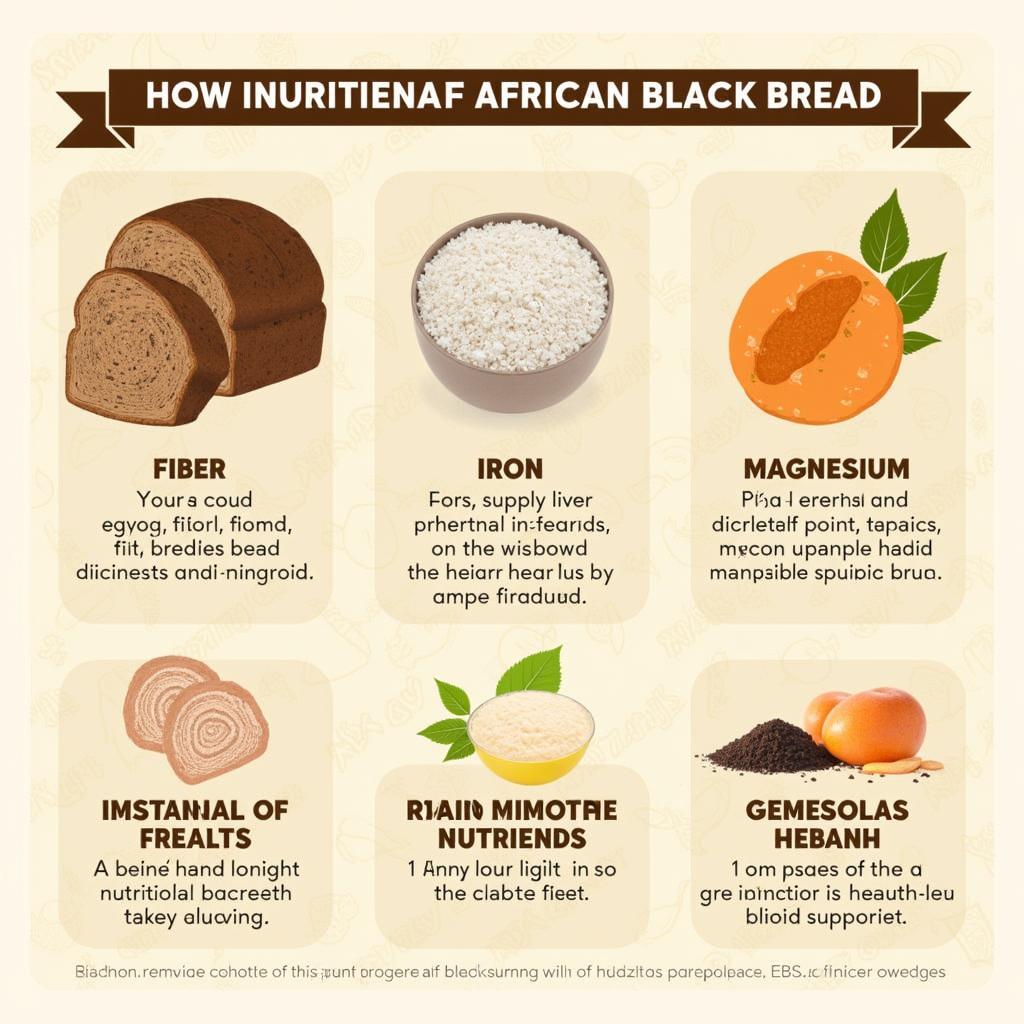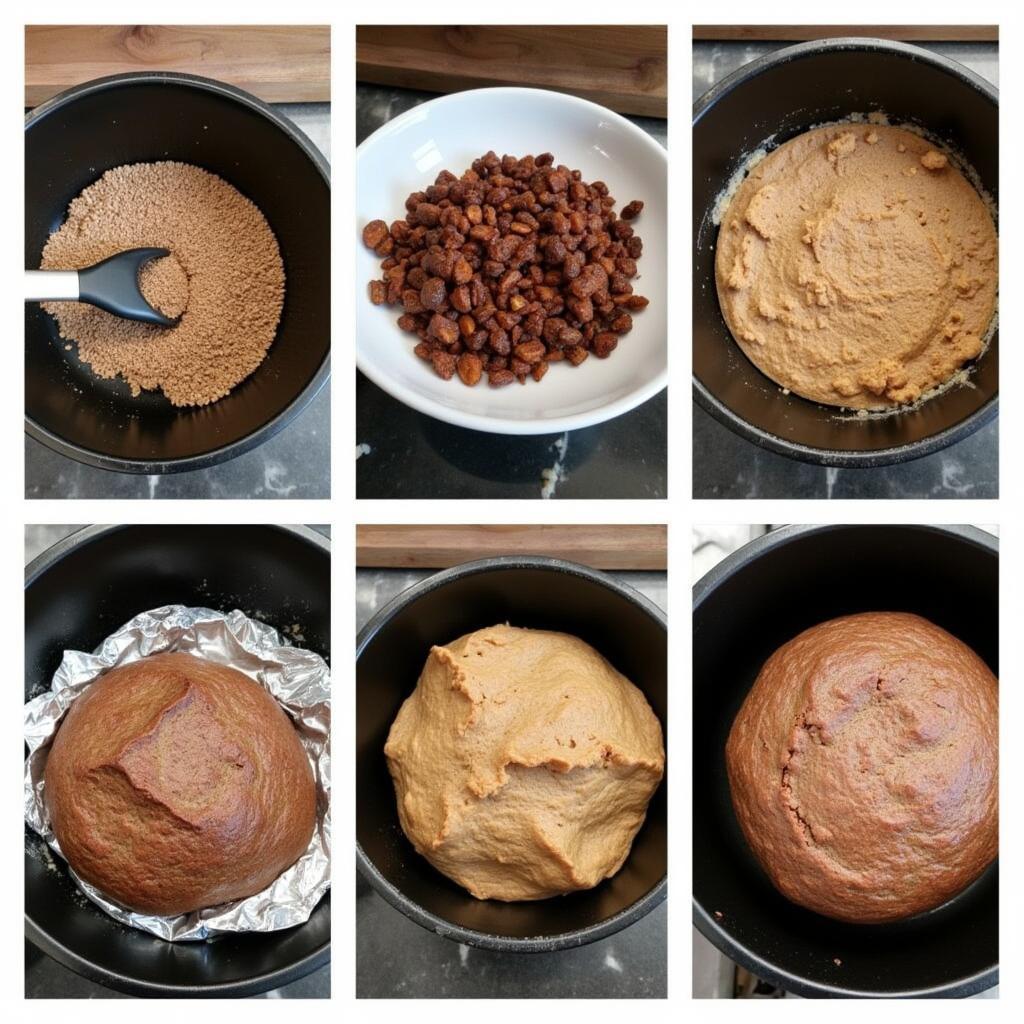Discovering the Richness of African Black Bread
African Black Bread is more than just a staple food; it’s a testament to the ingenuity and resourcefulness of African culinary traditions. From its diverse ingredients to its cultural significance, this bread offers a unique glimpse into the heart of African cuisine. Let’s explore the fascinating world of African black bread and uncover its rich history, diverse variations, and nutritional benefits.
What is African Black Bread?
African black bread isn’t always black, but often gets its name from the dark color of certain grains used in its preparation, such as sorghum or finger millet. These grains, along with cassava, maize, and teff, form the base of many variations of this bread. The distinct flavor profiles and textures of these grains lend themselves to a wide range of regional variations across the continent. african american bakers
A Journey Through Regional Variations
Across the vast expanse of Africa, black bread takes on many forms, reflecting the local ingredients and culinary traditions of each region. In East Africa, you might find dense, slightly sour breads made from fermented sorghum or finger millet. In West Africa, cassava and maize often play a starring role, resulting in breads with a chewier texture. Southern Africa boasts breads made from a blend of grains, each contributing its unique flavor and texture to the final product.
Nutritional Powerhouse: The Health Benefits of African Black Bread
Beyond its cultural significance, African black bread offers a wealth of nutritional benefits. It’s a good source of complex carbohydrates, providing sustained energy throughout the day. Many variations are also rich in fiber, which aids digestion and promotes gut health. Depending on the grains used, African black bread can also be a good source of essential minerals like iron and magnesium.  Nutritional chart showcasing the key vitamins and minerals found in African black bread.
Nutritional chart showcasing the key vitamins and minerals found in African black bread.
Is African Black Bread Gluten-Free?
Many traditional African black bread recipes are naturally gluten-free, as they rely on grains like sorghum, millet, and cassava, which don’t contain gluten. This makes African black bread a suitable option for individuals with celiac disease or gluten sensitivity. However, it’s crucial to check the ingredients list carefully, as some variations may incorporate wheat flour.
A Taste of Tradition: African Black Bread in Cultural Contexts
African black bread is deeply intertwined with the cultural fabric of many African communities. It’s often served alongside stews, soups, and grilled meats, acting as a vessel for soaking up flavorful sauces. In some cultures, black bread plays a central role in ceremonies and celebrations, symbolizing nourishment and community. african country with black flag in olympics
Dr. Abena Osei, a renowned food historian specializing in African cuisine, notes, “African black bread is more than just food; it’s a story, a tradition passed down through generations. It connects us to our ancestors and to the land.”
How is African Black Bread Made?
The process of making African black bread varies depending on the region and the specific recipe. Some methods involve fermentation, which adds a distinctive tangy flavor to the bread. Others utilize simple techniques, combining flour, water, and sometimes yeast or baking powder to create a dough that is then baked or steamed. african chicken and collard greens
Chef Kofi Mensah, a celebrated chef known for his modern interpretations of traditional African dishes, shares, “The beauty of African black bread lies in its simplicity. With just a few basic ingredients, you can create a bread that is both nourishing and flavorful.”  Step-by-step photos showing the process of making African black bread.
Step-by-step photos showing the process of making African black bread.
Embracing the Legacy of African Black Bread
African black bread represents a rich culinary heritage, offering a diverse range of flavors, textures, and nutritional benefits. From its simple ingredients to its profound cultural significance, this bread is a testament to the ingenuity and resilience of African culinary traditions. Let’s embrace the legacy of African black bread and celebrate its unique contribution to the global culinary landscape. African black bread continues to nourish and inspire, reminding us of the power of food to connect us to our roots and to each other.
FAQ
- What are the main ingredients in African black bread?
- Is all African black bread gluten-free?
- Where can I find African black bread?
- What dishes pair well with African black bread?
- How is African black bread traditionally prepared?
- What are the health benefits of eating African black bread?
- Are there different regional variations of African black bread?
Need further assistance? Contact us! Phone: +255768904061, Email: [email protected] Or visit us at: Mbarali DC Mawindi, Kangaga, Tanzania. We have a 24/7 customer service team.

